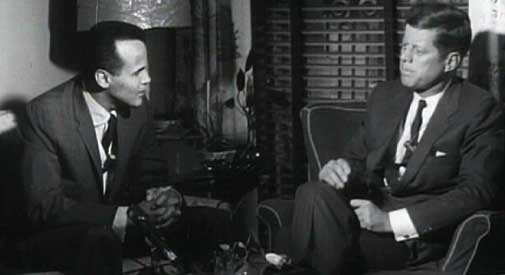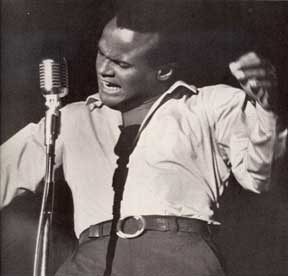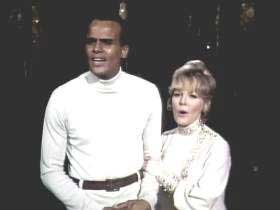
Monday night at 10 ET, HBO premieres Sing Your Song, a 90-minute biography of Harry Belafonte that has a lot in common with that network's recent, equally triumphant and illuminating George Harrison documentary.
Both are loaded with rare photographs, recordings and film and TV clips. Both drop more big names than a Who's Who compendium. And both look at artists who were as concerned with social activism, and personal enlightenment, as with making music...

Even the basics of Harry Belafonte's background, as recounted in this 2011 HBO acquisition, will be surprising to many. Born in Harlem, he was raised in Jamaica. Not Queens. The tropical island. He returned to New York at the outset of WWII, when he joined the Navy. After the war, he discovered acting, then jazz music, then singing.
Just the story of "Day-O (The Banana Boat Song)," Belafonte's most famous musical hit, would carry the story line here -- but Belafonte's story is so multifaceted, that's little more than a footnote.
Similarly, his boldly controversial 1968 appearance on The Smothers Brothers Comedy Hour is a chapter of his story with a lot more to tell than is revealed here. (I know, because it earned an entire chapter in my book on the Smothers Brothers.)
But it's not laziness that keeps filmmaker Suzanne Rostock from exploring these topics in more depth. It's just that there's so much more to cover. When the subjects on the table include Belafonte's relationships with -- just to name a few -- Nelson Mandela, Robert F. Kennedy, Paul Robeson, Eleanor Roosevelt, Quincy Jones and Barack Obama, Sing Your Song is a narrative that zips by, letting us peek into a life that dazzles even as it impresses.

TV lovers will find some extra treasures within, though. There are clips from his An Evening with Belafonte TV special, and his other super-early television work, that I've never seen before. Also, there's a clip from his infamous guest appearance on a Petula Clark prime-time special, which enraged sponsors, and parts of America, because she reached out and touched him as they sang together.
For television, as for the country, that was a very different time. And in this time, TV doesn't dishonor Harry Belafonte. It honors him instead.
In more ways than one, it's about time...